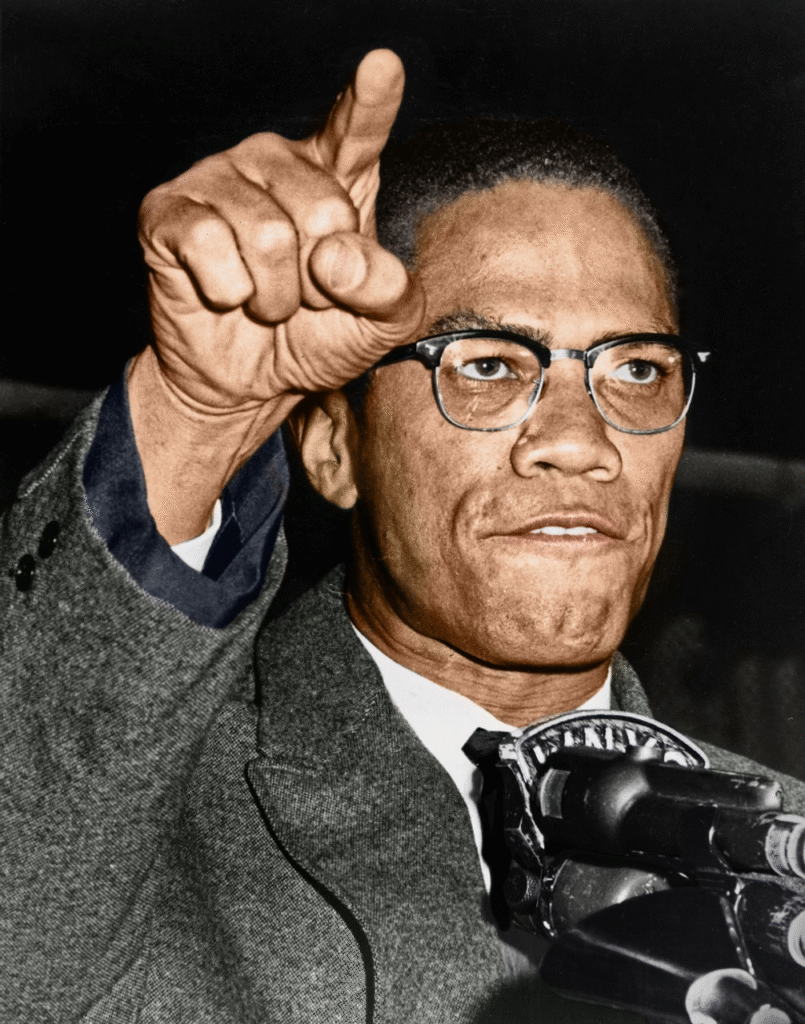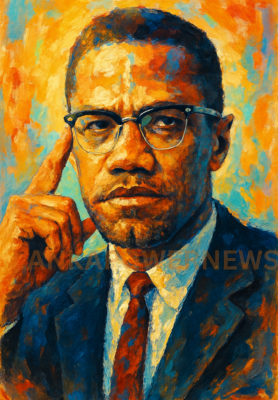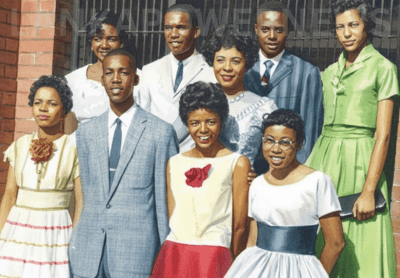Malcom X’s Language Features..!
This is a political speech delivered by Malcolm X, a Muslim minister famous for his involvement in the 20th Century Civil Rights Movement that occurred at the time. He was largely known for his rather ‘alternative’ views on the matter in comparison to the strategies of other black leaders, such as Martin Luther King. For the larger part of his political career Malcom X had preached Black Nationalism and a strong hate for his white opposition, while also loudly disagreeing with the mainstream of activism at the time. He was a Separatist who did not believe in nonviolent action, as others in the movement did – until 1964, directly after delivering this speech, where he took a religious pilgrimage to Mecca and founded a new outlook on his politics. The speech’s audience was mainly other African Americans, and most of the speech was addressed to them.

https://images.jacobinmag.com/2015/05/17003926/AA9rPNl-1.jpg
Rhetorical Question
Characteristics
During America’s election year of 1964 Malcolm X, notable Civil Rights leader and Minister, delivered the speech ‘The Ballot or the Bullet’. This year was, in X’s eyes, incredibly important to the Civil Rights Movement, considering the power the President held regarding it. The purpose of the speech was to make sure the people of the black community understood the importance of the election as well and who they voted for. This technique is typical because a rhetorical question in a speech triggers deeper thinking in a listener X knows his audience is built up majorly of the black community, who X claims is the deciding factor in votes, and he wants the audience to think about their choices in their election, and to take their history with the Government of America into careful consideration.
During this section of his speech, he talks about the common and frequent injustices the black community has undergone in the long-range of past years, and pleads “Why can’t they pass something that will help you and me?”. This example is used to highlight the repetitive wrongdoings of the American political system when it comes to African-Americans, specifically referring to passing bills that would benefit them. This points out that the Government in America doesn’t actually care about helping the black community. In the context this example shows a combination of a rhetorical question and inclusive pronouns evokes a sense of unity and connection between the audience and the speaker, which is exactly what Malcolm X needs to portray to make enough of an impact on his audience that they vote for the right President.
Explanation of Malcom X
The specific example of language has been influenced by the context because Malcolm X wrote this speech to be delivered in Churches to a African-American audience. The rhetorical question in the example is used to personally connect with the audience, humanising the situation. Generally, people care more about an issue if they can relate to it, and reminding the audience of the constant injustices they – and who they descended from – is exactly what the example intends to do. Using “Why can’t they pass something that will help you and me?” Malcolm X references the history of uncooperative state Governments with the word ‘they’, and refers to the whole of the black community with the word ‘you’.
He additionally incorporates inclusive pronouns to involve himself in the image he creates with this technique with the word ‘me’, further pulling on the emotional connections the audience has to his viewpoint of the election. By doing this he can impact the audience in a way that makes them carry his message with them as they make their decision in the election. Rhetorical Questions outline points of focus in a speech in a captivating and memorable way, which is why X chose to use them in his speech, as the importance of the audience’s understanding was immense.
His Message.
Therefore I can draw the conclusion that Malcolm X used the language feature of Rhetorical Question in this specific example to make sure his points were unforgettable and impactful using notable history he was sure the audience would pick up on. “Why can’t they pass something that will help you and me?” referred to the lack of political movements on the opposition’s side to actually aid the black community. The message he delivered relied on if the audience would ferment on the ideas, and would think about it on their own before making the decision to vote. To ensure this, Malcolm X drew from common history and personal connections that he knew everybody in the audience would have: the Civil Rights movement, plus regular ignorance from the federal and state governments.
We know from the context that the movement had been in action for a good many years so far. As a political movement endures time, generations cycle through it, each different in their own ways – but this can cause impactful moments to fade in importance or relevance, which is exactly what Malcolm X uses to his advantage.
He uses the historical context to force his audience to contemplate the conditions they face in America, and to compare them to how it used to be/how it could be. “…something that will help you and me..” vaguely points at a number of past issues, including the Jim Crow laws of Southern discrimination that were in power, much at the expense of African-Americans at the time. Malcolm X would like to emphasise that the black community should not settle for less, or they could end up trusting those who aren’t in favour of trying to help them.

https://praja.lk/wp-content/uploads/2020/06/Malcom-X.jpg
Analogy
Characteristics
Malcolm X uses the analogy “I’m not going to sit at your table and watch you eat, with nothing on my plate, and call myself a diner. Sitting at the table doesn’t make you a diner, unless you eat some of what’s on that plate,” in this section of the speech to compare the conditions of America regarding its people, namely the African-Americans and the White Americans.
He refers to the White Americans as ‘you’, pointing the analogy at them specifically, and places himself personally as a representative of the black community. The ‘table’ represents America, while the ‘plate of food’ illustrates human rights in America as something that can be shared amongst the table, but will not be. Furthermore, he points out the absurdity of calling himself a ‘diner’ when he has nothing on his ‘plate’. The analogy outlines his viewpoint on issues within the black community and Civil Rights movement at that point, and is used to highlight the inequity present in America that Malcom X claims he will not overlook, as others might.
Why?
This technique is typical because Malcolm X knows his audience is made up of regular civilians, and it is important to make sure they understand him. Analogies are often used in speeches to bring a fresh tone and perspective to the piece, ensuring attention is kept and the message is memorable.
A simple example, such as the dinner with a group, is a good baseline that everyone in the audience can understand and envision on their own, as well as insert themselves in the place Malcolm portrays for himself. In context, this example means to draw focus to the known history of systemic erasure in America surrounding minorities and their plights, which X means to warn the audience of; not to accept less from the Government, that their journey to equality is still underway. This is shown in the form of a meal not shared, but instead eaten in front of someone who has nothing, an analogy for America’s injustice.
Explanation
The specific example of language has been influenced by the context because Malcolm X was known for his separatist beliefs and alternative ideas compared to more famous leaders such as Dr. Martin Luther King Jr, however, in this analogy he depicts himself and his people as sitting at the same ‘table’ as the whites of America (who he refers to as ‘you’). This contrasts the ideal he and his activism groups had been preaching previously – for the Africans in America to either leave the country entirely or to have their own state within it. Rather than preaching the idea of moving to a separate table, where everyone is able to have a full plate, he focuses on the sheer cruelty that this ‘table’ will not allow all of its members a meal.
What Does This Show?
This shows how no matter how different the motives and objectives of the black leaders in the Civil Rights Movement was, they all desired for African-Americans to be seen and treated as equals to the American Whites, which influences their speeches in turn. Even though this shows connection to MLK’s ideals for America( an integrated country) , Malcolm X does not share his calm demeanour, and often his verbal language specifically shares tones of anger and strength, contrasting MLK’s pacifism and integration-heavy language.
This example communicates this without outright threats of violence, and creates an image for Malcolm X among the masses of enemies and allies to be someone who will stand for his rights with bravery. Malcom X uses this example to show that even though he believes his people deserve their own ‘table’ to sit at, as long as they stay at this table, they should be offered a plate with as much food as everybody else.
Diner in the Table.
Therefore I can draw the conclusion that Malcolm X uses the analogy “I’m not going to sit at your table and watch you eat, with nothing on my plate, and call myself a diner. Sitting at the table doesn’t make you a diner, unless you eat some of what’s on that plate” as both a way to connect with his majority black audience and personalise his speech, but to assert his morals and strength as a leader of unity rather than racial segregation.
We know from the context that X identified as a separatist who believed African-Americans were better off away from White American. It was important for him to clarify to his opposition, who themselves were largely segregationist, that this did not mean African-Americans were lesser-than in any way, and still deserved equality (using the imagery of a dinner shared), which would be fought for if they weren’t given it.
He did not entirely align with MLK and other known leaders’ views, but he agreed with them on a blanket core idea in all Black Civil Rights ideals: African-Americans are equals to White Americans, which is what he emphasises using this analogy. If African-Americans were not given their own table, then they deserved the same meal. The analogy emphasises that it is unacceptable to be pushed towards inferiority, specifically in the phrase “Sitting at the table doesn’t make you a diner, unless you eat some of what’s on that plate.” Malcom X rejects the idea of being satisfied with only being able to sit at the table, and urges his audience to strive for more.

https://cdn11.bigcommerce.com/s-yzgoj/images/stencil/1280×1280/products/1585633/4733974/apimg0ap0__78221.1626813623.jpg?c=2
Inclusive Pronouns.
Inclusive Pronouns are used repeatedly in X’s speech, such as in the example “And as long as you and I have been over here, we aren’t Americans yet.” Malcom X uses the language feature in this example to include himself within his target audience, the black community, and remind them that although he is a speaker, leader and minister, he is treated as an alien by the people of their country as well. This technique is typical of the context because Malcolm X strived to unite his people as a Nation. As a separatist, it is part of his belief system to seek a bond between the individuals black community, as his goal was for them to return to Africa as a whole or to be given their own state.
Characteristics.
Additionally he reminds them of how long Africans have been a part of the American population. This example is used to highlight the unfairness of some white Americans logic: at the time, many European immigrants had been arriving in America due to the Vietnamese War. These people were accepted, and Malcolm X pointed out the hypocrisy in these actions, as African-Americans had been a part of the American population far longer. In the context the example means that X believes that no matter how long the African-Americans live and fight in America, they will not be considered Americans by those around them, purely based on their looks. Malcom X uses this language feature to strategically empower the black community with harsh reality, and emphasise the importance of the upcoming election when taking relevant events into consideration.
Another relevant use of this language feature is the example of “… and you and I are in the middle. It’s time for you and me to wake up and start looking at it like it is, and trying to understand it like it is, and then we can deal with it like it is.” This example has a combination of inclusive pronouns, repetition, and the rule of three, and it is placed at the end of a paragraph outlining the continued differences between blacks and whites during the Vietnamese War. All of these features are used to drill in the overarching message and tone.
Explanation .
The specific example of language has been influenced by the context because Malcolm X was known for his separatist beliefs and alternative ideas compared to more famous leaders such as Dr. Martin Luther King Jr, however, in this analogy he depicts himself and his people as sitting at the same ‘table’ as the whites of America (who he refers to as ‘you’). This contrasts the ideal he and his activism groups had been preaching previously – for the Africans in America to either leave the country entirely or to have their own state within it. Rather than preaching the idea of moving to a separate table, where everyone is able to have a full plate, Malcom X focuses on the sheer cruelty that this ‘table’ will not allow all of its members a meal.
Why Did Malcom X Use It?
This shows how no matter how different the motives and objectives of the black leaders in the Civil Rights Movement was, they all desired for African-Americans to be seen and treated as equals to the American Whites, which influences their speeches in turn. Even though this shows connection to MLK’s ideals for America( an integrated country) , Malcolm X does not share his calm demeanour, and often his verbal language specifically shares tones of anger and strength, contrasting MLK’s pacifism and integration-heavy language.
This example communicates this without outright threats of violence, and creates an image for Malcolm X among the masses of enemies and allies to be someone who will stand for his rights with bravery. X uses this example to show that even though he believes his people deserve their own ‘table’ to sit at, as long as they stay at this table, they should be offered a plate with as much food as everybody else.
As a Civil Right Leader of Malcom X.
Therefore I can draw the conclusion that in order to ensure his reputation as a minister and Civil Rights leader to the black community of America is consistently positive, Malcolm X uses Anaphora to draw attention to his own personal shortcomings. This also highlights themes of perseverance and helps him to connect with the intended audience of African-Americans. Though Malcom X is a Muslim Minister, he preaches inside a church in both deliveries of this speech, which implies something about X’s own acceptance of differences within the people he speaks to.
He uses this specific example to level with his listeners on a personal and human level. We know from the context that in the 20th Century Civil Rights Movement, one of the most essential aspects of activism was working as groups and organisations. Regulated harmony amongst the activists lead to coordinated acts/demonstrations, and further successes to follow. Malcolm applies this logic to the example, using the phrase that points out his flaws to better connect with those listening to him and perhaps convince them further of the cause he wishes to preach.

Anaphora.
While Malcolm X was a well-known minister and speaker on the activism scene, he had little formal education, much unlike other leaders. He had dropped out of school in the eighth grade, due to racial discrimination, even though Malcom X was an exceptional student. He stresses this in a specific example that features Anaphora. “I’m not a politician, not even a student of politics; in fact, I’m not a student much of anything. I’m not a democrat. I’m not a Republican…” Using Anaphora, he repeats ‘I’m not’ statements, particularly focusing on his lacking in official education, which at this era was a marking of respect amongst men of leadership.
Characteristics.
This technique is typical of the context because Malcolm X, as a leader of a Black Power organisation, preaches often to uplift others and is looked to for advice, guidance and control. In a movement like Civil Rights in the ‘60s, it was important to humanise speakers, especially in wide-spread tactics in demonstrations themselves. Black people in America were already framed as villains, thieves, and violent, so it was imperative activists did not reinforce this idea in the eyes of the public. Malcolm X, however, was not the typical minister, and his approach was far different – he instead promoted the idea of violence against oppression. However, as starkly he considered his opposition, Malcolm X knew the importance of humanising himself to his audience when it mattered.
This speech in particular called for humanisation, as the majority of his audience was made up of his allies, and of his people. This example is used to represent X’s own personal experiences in the world of racial discrimination, pointing out his inability to achieve a formal education of someone of his stature, but to also present himself as someone who defied odds. Malcom X underlines every part of himself and his past to remind his audience that he is not perfect and will not claim to be. In the context the example means to say to his audience ‘I am not much’, keeping a modest and human reputation as an activist leader.
Explanation
The specific example of language has been influenced by the context because Malcolm X favours repetition and Anaphora frequently in his speeches, specifically to create a focal point in a large body of text/topic. In the example “I’m not a politician, not even a student of politics; in fact, I’m not a student much of anything. I’m not a democrat. I’m not a Republican…” Malcom X uses Anaphora to draw attention not only to the traits he describes but the tone. After previously speaking in that same section about the odds the audience must face in order to overcome what the opposition plans for them (“These odds aren’t as great as those odds.
And if you fight here, you will at least know what you’re fighting for”) he circles in on himself, a choice made to purely emphasise his own shortcomings. As a speaker and leader, X does not want to criticise his allies and come off as seeing himself superior to them. He acknowledges that they all have flaws, and there is a normal amount of fear involved in the situation he discusses, but bravery is necessary. Anaphora helps him concentrate attention on specific sentences such as this example’s, and make sure no one misinterprets his message to be one nongenuine and pretentious. Malcom X desires to be seen only as human as an ally to the people he speaks to.
Conclusion.
Therefore I can draw the conclusion that in order to ensure his reputation as a minister and Civil Rights leader to the black community of America is consistently positive, Malcolm X uses Anaphora to draw attention to his own personal shortcomings. This also highlights themes of perseverance and helps him to connect with the intended audience of African-Americans.
Though Malcom X is a Muslim Minister, he preaches inside a church in both deliveries of this speech, which implies something about X’s own acceptance of differences within the people he speaks to. He uses this specific example to level with his listeners on a personal and human level. We know from the context that in the 20th Century Civil Rights Movement, one of the most essential aspects of activism was working as groups and organisations. Regulated harmony amongst the activists lead to coordinated acts/demonstrations, and further successes to follow. Malcolm X applies this logic to the example, using the phrase that points out his flaws to better connect with those listening to him and perhaps convince them further of the cause he wishes to preach.








